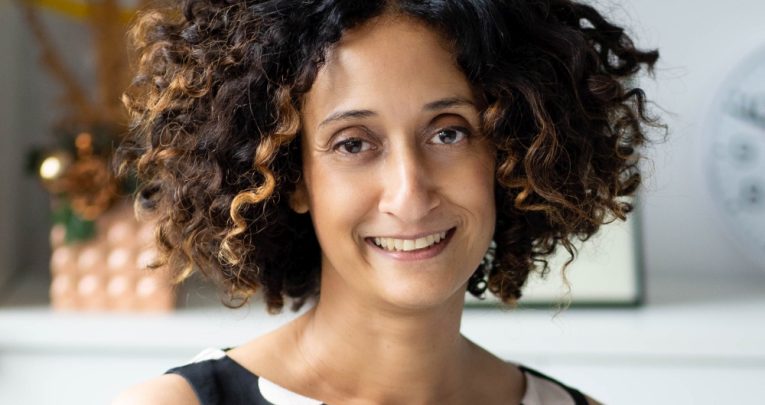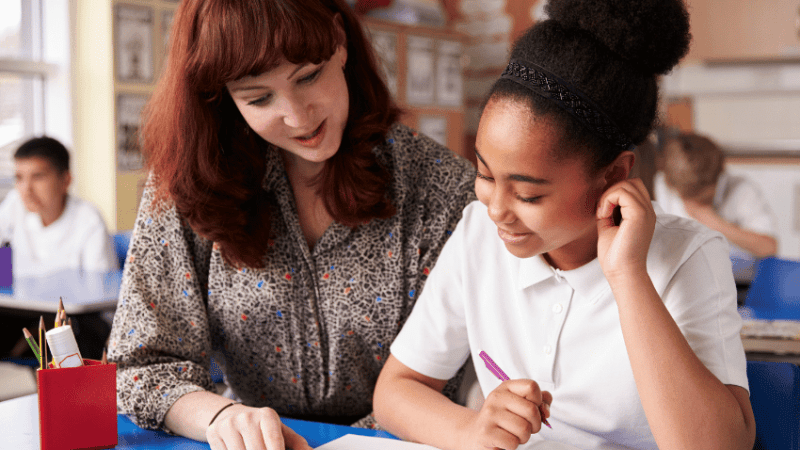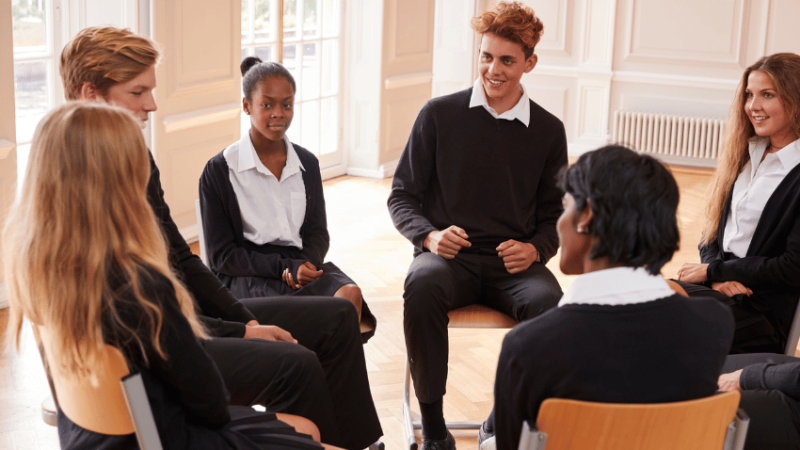“I’m an education radical” – Katharine Birbalsingh, Michaela Community School and the power of culture

Katharine Birbalsingh tells Callum Fauser what makes the ‘Michaela way’ effective at addressing the disadvantages some students face as a result of their background…

- by Callum Fauser
- Editor of Teach Secondary magazine

It’s long been the case that a young person’s background can have a disproportionate impact on his or her educational outcomes and later life chances. Yet despite numerous promises of action among policymakers and the concerted efforts of the teaching profession, that largely remains the case at a national level.
However, we’ve also seen individual schools pursue distinct approaches to teaching, learning and behaviour which, going by the traditional metrics of Ofsted and GCSE results, at least, seem have made a real difference.
Often these will be schools that have hit upon an approach that works and will pursue said approach doggedly, allowing little to no room for compromise.
Boot Camp
One school that certainly fits that description is Michaela Community School in Wembley. Originally opened in 2014 as a free secondary school, it’s gone on to generate headlines, win over admirers and attract fierce critics in the years since. Much of that is down to its well-known reputation – a carefully, perhaps even gleefully cultivated one as the ‘strictest school in Britain’.
Talking to headmistress (note, not headteacher) Katharine Birbalsingh in September 2020, she notes that while some of the finer details of life at MCS might have changed, “The values of the school have always remained the same. We maintain a real belief in personal responsibility, duty and community. We see knowledge as being central in terms of our lessons, and hold extremely high standards of behaviour and expectations of our children.”
That much is clear in Birbalsingh’s references to the ‘Boot Camp’ sessions being attended by the school’s Y7s at the time of our conversation. “It’s six to seven days of teaching them how to behave in a Michaela way,” she explains. “We teach lessons on ethos and buying into the culture we’re giving them, explaining why we give detentions for misbehaviour, why we have a merit system and why we believe in personal responsibility.”
Expanding on this, Birbalsingh reasons that, “It’s unfair to punish children for not behaving when you haven’t taught them how to behave. We believe very much that a child has agency; that they can decide whether to do the right or wrong thing. But they won’t actually know what the ‘right’ and ‘wrong’ things are unless that’s been taught to them.”
Peace and order
Explicit teaching around behaviour in Y7 is one thing, but what about the school’s returning Y9s? Is there any ‘topping up’ of teaching around behaviour to ensure standards don’t slip?
“When students come back after a half term or holiday we’ll do a couple of lessons of Boot Camp to remind them,” Birbalsingh confirms. “When they’ve been away they’ll often forget how to be polite, because they’ve been out of this environment that expects that of them. But once reminded, they manage to do it all again quite easily.”
Warming to her theme, Birbalsingh contends that “Our view is that if you just put children in an environment and hope they manage to swim, some will and some won’t. That doesn’t support the weakest. But if you teach children explicitly how to do something, you’ll catch everybody. That’s why we teach our children to always walk in corridors quietly, looking to the front and in single file.”
Given the upset and mass absences that schools worldwide have had to contend with in 2020, I have to ask – how have the students and teachers at MCS found the experience of returning to school after lockdown?
“It’s all going very well,” asserts Birbalsingh. “We were very COVID-safe to begin with. Our silent corridors mean that children aren’t talking, and the single file lines see to it that social distancing is observed. At other schools it’s a lot more loose, isn’t it? Children are allowed to go wherever they want and chat to whomever, which isn’t the case with us. If anything, we were ideally placed for this situation.”
It’s that sense of freedom being denied to MCS students that feeds in to the almost cartoonish Gradgrind-esque picture that critics like to paint of the school.
To hear Birbalsingh tell it, though, “The wild freedom that exists elsewhere doesn’t help the most vulnerable. The child who comes to us from a chaotic home is able to find order here at the school. That’s what our detractors don’t understand – if you allow certain children to find chaos at school, then their entire lives are chaotic and they’ll never get to experience peace and order.”
Children are children
This commitment to instruction, order and consistency naturally extends to the classroom, where a traditional approach of explicit, knowledge-based teaching in front of the class holds firm.
According to Birbalsingh, “Our detractors don’t believe in the authority of the teacher to stand at the front and lead the learning. They’d rather the children led the learning in groups and taught themselves, while the teacher moves around as a facilitator of learning and keeps them on task.
“What we’d say is that children are children, and that they can’t make those decisions. It’s the teacher who should be leading that learning, and leading that discipline. If you don’t believe in adults being the authority, then you’ll disagree with everything we are.”
This, it seems to me, cuts through to how ‘freedom’ is ultimately understood at MCS. Rather than emphasising ‘freedom to’, the school seeks instead to provide ‘freedom from’.
As Birbalsingh herself puts it, “In some schools, you might arrive at your next lesson 10 or 15 minutes late – time that could have been used teaching you how to read. When 20% of children in Britain leave school functionally illiterate and innumerate, I don’t see how that’s setting them free. I’d argue that kind of freedom at school will confine them for the rest of their lives and keep them in that cage of illiteracy and innumeracy.”
Founded in knowledge
Whether one agrees with the rigorously enforced policies of MCS or not, it’s hard not to be impressed by the strength of Birbalsingh’s conviction and the extent to which the school has been able to project its philosophy out into the wider world.
As well as receiving frequent (albeit pre-COVID) visits by educators from around the country and abroad, the school has published two books, Battle Hymn of the Tiger Teachers in 2016 and The Power of Culture earlier this year.
“No other school has ever produced two books written by its teachers,” Birbalsingh notes. “Individual teachers write books; you don’t typically have a whole school writing a book.”
This too seems like an extension of the importance the school places on imparting knowledge over student-led enquiry and exploration.
To the charge that such approaches may work to stifle students’ creativity, Birbalsingh offers the following: “Creativity is founded in knowledge. You can’t be creative or independently-minded about something you know nothing about.
“I’ve always felt my role is to demonstrate what excellence looks like in education, and I’m extremely creative when it comes to education – I’m an education radical, but only because I know the area really well. It’s only possible to do that when you’re very knowledgeable about something and succeed.”
Above all, though, Birbalsingh is keen to clear up one particular misconception: “There’s this myth that says we love being horrible to children. What teacher wants to be horrible to a child? Some teachers might think they’re being nice for letting a student off, but in the end, when that child doesn’t learn how to read, you’re the one who’s failed them and denied him or her the opportunity of receiving a free education and doing something with it.”
Michaela: The Power of Culture is available now (John Catt, £16); for more information, visit mcsbrent.co.uk or follow Katharaine Birbalsingh at @Miss_Snuffy.










